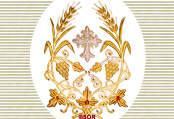
 |
|
||
| Report on Christological dialogue betweeen Anglican Communion and Oriental Orthodox Churches |
|
OO Meetings
Other Dialogues
|
The Anglican Communion has reached a landmark consensus on Christology with the Oriental Orthodox Churches. Under the co-chairmanship of His Eminence Metropolitan Bishoy of Damiette of the Coptic Orthodox Church, and the Rt Revd Dr Geoffrey Rowell, Bishop of Gibraltar in Europe (the Church of England Diocese in Europe), Anglican and Oriental Orthodox members of the Anglican-Oriental Orthodox International Commission, appointed by their Churches, met in the Mother See of Holy Etchmiadzin of the Armenian Apostolic Church from November 5-10, 2002, at the invitation of the Catholicosate of All Armenians. The Commission produced an Agreed Statement on Christology, to be submitted to the authorities of the Oriental Orthodox Churches and the Anglican Communion for their consideration and action. Both Churches said they confessed that there was "one Christ, one Son, one Lord" and that "the perfect union of divinity and humanity in the incarnate Word is essential to the salvation of the human race". The agreement addresses one of the oldest divisions in Christian history, dating back to the Council of Chalcedon in AD 451. The Oriental Orthodox Churches - Armenian, Coptic, Ethiopian and Syrian Orthodox - rejected the council's definition of Christ as one person "in two natures". Reports of the Meeting: 1. Report in the Anglican Communion 2. Report in The Times 2002.11.23, November 23, 2002, Credo From East to West, in Jesus we encounter God incarnate At the beginning of this month I was in Armenia for a meeting between bishops and theologians of the Anglican Communion and of the Oriental Orthodox churches, the ancient Christian churches of Egypt, Armenia, Syria, Ethiopia and the Malabar coast of India. The Church of England has had long and close relations with these Churches, which have now spread beyond their ancient heartlands to a diaspora in the Western world, and our meeting was the first of an official dialogue to work towards a deeper unity and even closer relations. These ancient Churches were the result of one of the earliest Christian divisions, a division in the 5th century concerning the nature of Christ, though political and cultural factors played a part, for these were all Christian communities on the fringe of, or beyond, the Eastern Roman Empire. The Council of Chalcedon in AD451, which spoke of two natures in Christ, was not accepted by these Churches, whose understanding was shaped by the teaching of St Cyril of Alexandria, who said that in Christ there was "one nature of the incarnate Word of God". For these Churches, the language of two natures, divinity and humanity, seemed to come dangerously close to a schizoid Christ, keeping God at a distance. In recent decades ecumenical conversations have gone a long way to resolving this ancient difference of understanding, and we rejoiced that in our own meeting Anglicans and Oriental Orthodox were able to agree a common statement on our understanding of Christ, and reach out to heal what is one of the most ancient Christian divisions. Such theological divisions and arguments can easily seem remote and distant from our contemporary world. They can be mocked, as Gibbon mocked the controversy over the understanding of the divinity of Christ in the Arian controversy, when, noting the different terms used, he said that Christendom was split over an iota. But in that controversy it was an important iota. What was at issue was whether Christ was a supernatural being but not fully God, or, as the Nicene Creed was to confess, He was fully and completely God. The ancient debates about the person of Christ have something of the same character, the point at issue being the unity of the person of Christ, the reality of His human nature and, centrally, the affirmation that God gave Himself fully and completely into our human condition. In a world in which Platonist philosophy spoke of a God remote from the flux and change of history, the Christian affirmation of the incarnation, of God taking human nature, was bound to be offensive. The struggles of the early Church with the nature of Christ are, in the end, struggles to say that the God with whom we have to do is a God who does not stand aside from His creation, but, in the words of the Lady Julian of Norwich, "comes down to the very lowest part of our need". In Christ God freely chooses to know our humanity from the inside. In Jesus we encounter no less than God incarnate. That is the radical, wonderful and challenging reality that is at the heart of the Christian faith. The remote, distant and uninvolved God, repudiated in the theological battles of the early Church, is always in danger of creeping back. The deists of the 18th century, who turned God into the abstraction of a first cause, setting the Universe going and then remaining all but absent from it, is but one instance of this. It is often such a God who is denied by atheists and tilted at by critics. But that is not the Christian God, who is uniquely revealed and known in Christ. In a few weeks we shall celebrate at Christmas that self-giving of God, and will sing the praise of that love which goes to the uttermost. Tomorrow, when the Church celebrates the Feast of Christ the King, the king we honour and praise is the one who embodies that same love, a king whose kingdom is a kingdom of justice, love and peace. To live the life of that kingdom is the Christian calling, a calling made possible by the one who came down to where we are that we might be exalted to share in His life. The Right Rev Geoffrey Rowell |
| Copyright © Syriac Orthodox Resources. All Rights Reserved. |
| Last Update: December 10, 2002 |